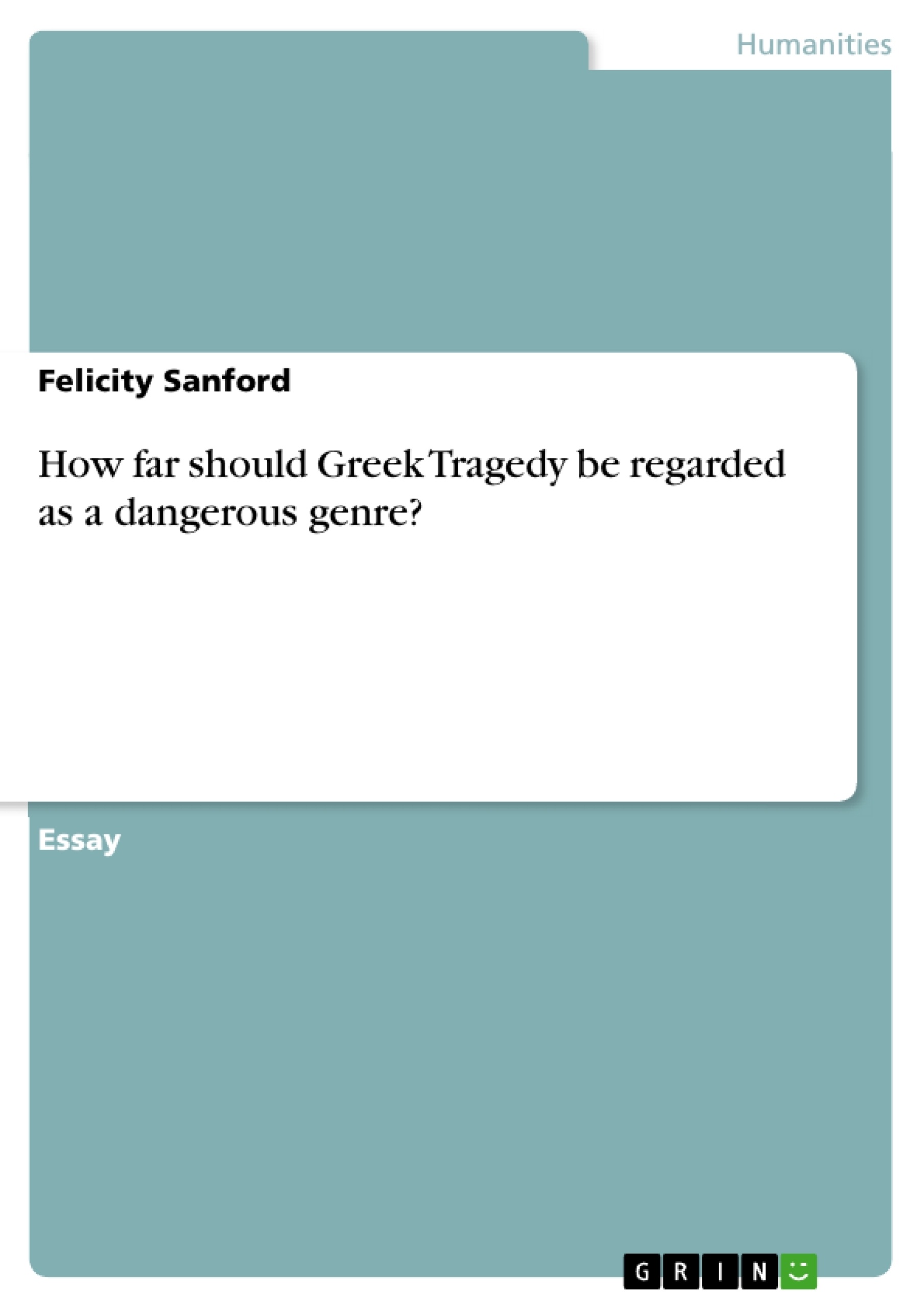When debating how dangerous the moral and social issues of a typical Ancient Greek play may be to an audience, it is imperative that the discussion includes comparisons between its effects on the original audience and on a contemporary audience. The focus of this debate is the issue of incest, which is a key component in typical Ancient Greek plays and a major topic regarding morality. The issue of related persons sharing sexual experiences has been debated since the BC age. When discussing this ethical issue it is necessary to observe that the moral implications of the plays inner meaning may affect its audiences through the ages in different degrees, depending on the social decorum of the time. A general example, Ellen Pollak (2003) has acknowledged incestuous relations within English novels that appeared between the late seventeenth and the early nineteenth century. A contemporary society finds this surprising due to this period of time’s identification as an era of sexual repression and the emphasis on strict protocol and etiquette.
I wish to uncover how far the two renowned Greek plays, Euripides’ Hippolytus and Sophocles’ Oedipus Rex, were treated as plays with delicate central subjects, what were the aims of the playwrights for writing about such moral matters and if the authorities of the time were worried about its effect on the masses. The portrayal of incest within a play also is debated because Greek plays did not show action on the stage but had a smaller role to describe to the Chorus, who acted as the voice of the spectators, what the off-stage action entailed. With this detached style of playwriting, how far can one presume that incest is a dangerous subject for an audience to watch?
In Oedipus Rex (1998), the audience is exposed to many taboo subjects. For example, there are elements of death, suicide, murder, violence, starvation alongside a more physical set of taboo ingredients such as blood, fluids, poison, burning incense, pus and disease. Because of these components, the play is a gruesome account of a historical event. Sophocles adapted his play from an already existent and well-known story. With this in mind, the audience would already know the denouement of the story and would be spectators of the way the ending was procured. (...)
Inhaltsverzeichnis (Table of Contents)
- Assessment 1
- Introduction
- Oedipus Rex
- Taboo Subjects
- Audience Perception
- Modern Interpretation
- Hippolytus
- Divine Intervention
- Contemporary Implications
- Miscommunication and Bad Advice
- Hippolytus's Nurse
- Oedipus Rex's Determination
- Conclusion
Zielsetzung und Themenschwerpunkte (Objectives and Key Themes)
This essay explores the potential dangers of Greek tragedy, focusing on the theme of incest as depicted in Euripides' "Hippolytus" and Sophocles' "Oedipus Rex." It examines how these plays, written for ancient audiences, might be interpreted by contemporary viewers and analyzes whether the portrayal of such taboo subjects could be considered dangerous.- The portrayal of incest in Ancient Greek plays
- The impact of these plays on their original audiences
- The relevance and interpretation of these plays in contemporary society
- The role of censorship and moral considerations in the reception of such themes
- The potential dangers of these plays, particularly regarding the portrayal of incest and its consequences
Zusammenfassung der Kapitel (Chapter Summaries)
The essay begins by introducing the concept of incest in Ancient Greek plays, emphasizing its significance as a taboo subject and its potential impact on audiences. The chapter focusing on "Oedipus Rex" highlights the play's depiction of various taboo subjects, including death, violence, and disease. It then analyzes how the play's themes were perceived by ancient audiences, who were already familiar with the story's denouement. The chapter also discusses the contemporary interpretation of the play, suggesting that its themes are still relevant today, but are subject to different levels of censorship and moral considerations. The section on "Hippolytus" delves into the play's emphasis on divine intervention and the power of the gods. It argues that the play's depiction of Aphrodite's revenge could have been seen as dangerous for ancient audiences, as it reinforced their sense of vulnerability to the whims of the gods. The chapter then explores the play's relevance to contemporary audiences, suggesting that its message regarding divine power may have lost its force due to changing religious beliefs. Finally, the essay examines the role of miscommunication and bad advice in driving the tragic outcomes in both "Hippolytus" and "Oedipus Rex." It argues that these plays highlight the dangers of acting on misinformation and the importance of careful deliberation.Schlüsselwörter (Keywords)
This essay examines the themes of incest, Greek tragedy, ancient audiences, contemporary audiences, censorship, divine intervention, miscommunication, and catharsis. It explores the potential dangers of these plays, focusing on their impact on both their original and modern audiences. Key works analyzed include Euripides' "Hippolytus" and Sophocles' "Oedipus Rex."Frequently Asked Questions
Which Greek plays are analyzed in this essay regarding dangerous themes?
The essay focuses on Euripides' "Hippolytus" and Sophocles' "Oedipus Rex."
What is the central taboo subject discussed in the context of these plays?
The central focus is the portrayal and moral implication of incest.
Why might Greek tragedy be regarded as a "dangerous" genre?
Because it exposes the audience to extreme moral dilemmas, taboo subjects like murder and incest, and challenges social decorum.
How does the perception of these plays differ between ancient and modern audiences?
Ancient audiences were often familiar with the stories and viewed them through the lens of divine power, whereas modern audiences might focus more on psychological or social repression.
What role does miscommunication play in these tragedies?
Miscommunication and bad advice (e.g., from the Nurse in Hippolytus) are key drivers that lead the protagonists toward their tragic fates.
- Citation du texte
- Felicity Sanford (Auteur), 2008, How far should Greek Tragedy be regarded as a dangerous genre?, Munich, GRIN Verlag, https://www.grin.com/document/118146



